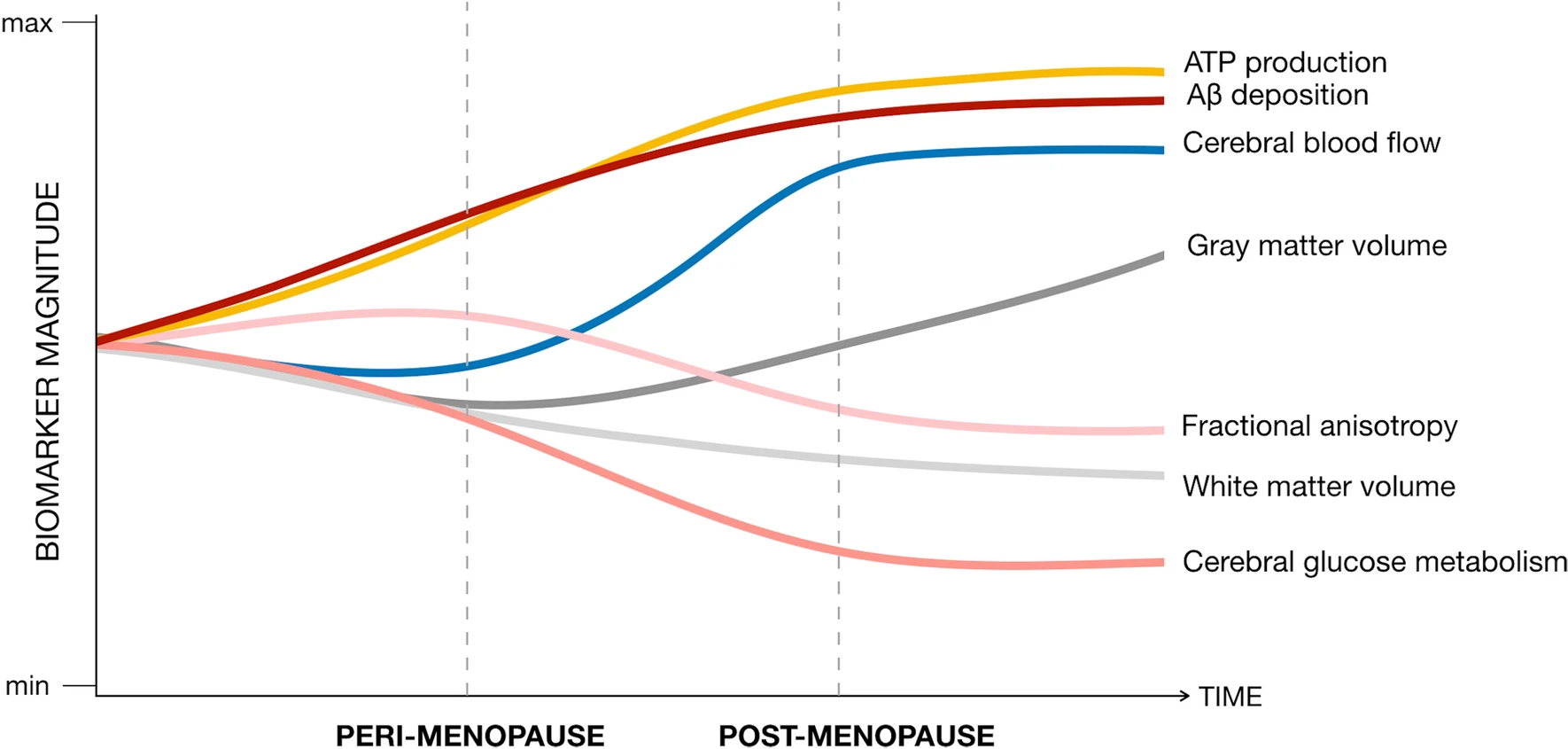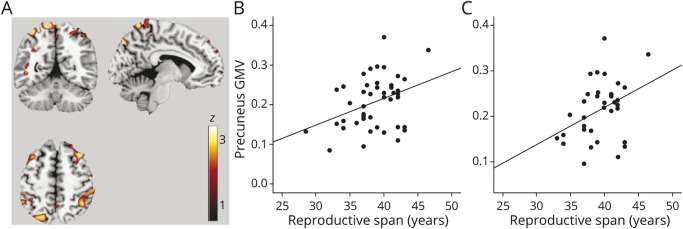Although women do better than men in memory and other cognitive functions, research has shown that the female brain ages more rapidly than men due to menopause.
Read on to learn how menopause affects your brain health and how you can maintain it to embrace this stage of life gracefully.
RELATED: What’s the Relationship Between Menopause and Anxiety?
Keep Your Mind Sharp at Any Age – Learn How Menopause Changes Your Brain
Understanding Menopause and the Brain
Menopause, the period when women have difficulty finding the younger self they used to have, has been widely thought to affect only the endocrine system and cause vasomotor symptoms like night sweats or hot flashes.
However, as estrogen declines with age and menopause, your brain starts getting “sluggish” and is more vulnerable to the impact of aging.
Yes, estrogen has a broader and more profound influence on the body than you think.
It is because although we tend to think of estrogen as a reproductive hormone, it serves as the female brain’s “master regulator.”
For example, estrogen drives the neurons to utilize glucose as energy for the brain. It’s also involved in brain cell development, plasticity, and immunity. As a result, estrogen maintains the youth and vitality of your brain.
What Are the Menopause Effects on the Brain?
So, what happens to your brain during menopause and the subsequent decline in estrogen?
The structure and neuronal connectivity of the brain and its energy metabolism change significantly depending on the stage of menopause. Below are the most recognized mechanisms by which menopause affects the brain.
Menopause Affects How Brain Cells Grow and Function
So we all know menopause is associated with a slow but steady decline in estrogen levels. As estrogen levels drop, the number and interaction between brain cells change, resulting in negative alterations in brain cells’ growth and function.
Of course, we don’t want our brain cells to change during this stage. Since aging is associated with the deterioration of our bodily functions, the more likely we can maintain the way our brain cells work, the better. Any “wobble” with age only harms our health.
Menopause Lowers the Level of the Fuel for Brain Cells
Falling estrogen levels also result in reduced cerebral glucose metabolism, the primary energy used for brain activity. This downhill in maintaining the “fuel” for the brain is the earliest change in the brain when women approach menopause.
Reducing the energy supply for our brain leads to multiple negative consequences. First, just like the tired muscles, a lack of energy causes your brain to feel “burned out,” leading to a drop in brain performance and, sadly, an increase in a common symptom called brain fog.
Menopause Temporarily Decreases Gray Matter Volume in the Brain
The menopause transition, especially from the pre-menopausal to the post-menopausal period, also lowers the volume of gray matter, the part of the brain that consists of a high concentration of neuronal cell bodies.
And because the gray matter is located in the brain region involved in memory, self-awareness, and social cognition, this dip may heavily impact memory and perception. Fortunately, this decline occurs only transiently and can be resolved in the years afterward.

Brain biomarker effects during the menopause transition. Source: Scientific Reports.
RELATED: Important Link Between Menopause and Heart Disease
Menopause Neurological Symptoms
Increased Forgetfulness
Low estrogen during menopause may fail to activate the amygdala at times, the memory center of the brain, leading to an increased tendency to slip away the actions and events that need to be done.
Reduced Processing Speed
Another menopause symptom may have you experience a slower speed for processing information. So you may be less responsive to daily tasks or find it difficult to read texts and follow conversations as fast as you usually do.
Impaired Verbal Learning
Not only will you need help to receive existing information, but you will also find it hard to analyze, store, and utilize new knowledge. In addition, increased forgetfulness, a typical symptom mentioned above, also hampers the learning process.
Menopause Brain Fog
Finally, the menopause brain – the inability to get thoughts straight – is real.
Suppose you occasionally find yourself standing in a room wondering why you are there, forgetting what you are supposed to do, or starting a conversation and forgetting what to say next. In that case, you probably have a brain fog.
Many theories exist as to why some women experience menopausal brain more severely than others, as about two-thirds of menopausal women experience brain fog.
Also, many women are concerned that brain fog is a sign of dementia and other brain conditions like Alzheimer’s. However, brain fog is likely transient and isn’t necessarily associated with a higher risk of dementia or Alzheimer’s disease.
Does Menopause Cause Memory Loss?
The answer is yes unless you want it to be a “no.”
An increase in amyloid-beta (Aβ), known for developing plaques within brain tissue in people with Alzheimer’s disease, has been linked to menopause and low estrogen production.
This phenomenon happens because estrogen has been found to improve neuronal resilience by lowering inflammation and amyloid-induced neurotoxicity. In contrast, estrogen depletion has been associated with accelerated neuronal aging and Alzheimer’s risk.
However, nobody should be “predetermined” to suffer from dementia or Alzheimer’s, as there is good news for women who are vulnerable to the disease.
Research has found that those with a greater reproductive span or longer childbearing years and more children or times of pregnancy may have a larger gray matter volume in the Alzheimer’s-vulnerable regions of the brain.
How so? Pre-menopausal status, reproductive span, and the number of children, all known as the reproductive history events, suggest more estrogen exposure and a higher estrogen level in the female body throughout the lifetime.
And although reproductive history events are not directly associated with better cognition, larger gray matter volume is positively associated with memory and brain performance.

Associations between reproductive span and gray matter volume. Source: American Academy of Neurology.
Still, this finding doesn’t mean that women must intervene with their reproductive history to avoid the risk of memory loss. For example, a mainstream approach to increasing estrogen is known as hormone therapy, which is further explained below.
RELATED: How to Avoid Alzheimer’s and Dementia
How to Maintain Brain Health During Menopause
Physical Activity
Physical activity is inarguably good for your muscles and bones, and so is it for your brain.
Exercise at any duration and intensity can help you think better, learn more, solve problems, and maintain emotional balance. It can also help with anxiety and depression.
You don’t have to be a fitness enthusiast to reap the benefits. Any amount of physical activity can be beneficial. In addition, physical activity, regardless of age or fitness level, can help improve sleep, a vital element for brain health.
Cognitive Activity
Cognitive activities are mental tasks that involve focus, attention, and concentration. These tasks can keep the brain active while preventing age-related cognitive decline.
A “brain test” to engage your brain? Not necessary.
Instead, reading books, doing simple jigsaw puzzles, and playing memory games can do all the tricks for you.
What’s also important is that you should diversify the cognitive activities rather than intensify them for better effectiveness. Researchers have discovered that people with the most cognitive diversity may have better brain function.
Dietary Habits
We are what we eat. Why? Food is the “fuel” for our body.
Food doesn’t only give us energy but also affects different body parts, including the brain. So, when your brain is feeling “down,” a good thing you can do is implement a healthy diet.
Dietary patterns such as the Mediterranean diet or those rich in omega-3 fatty acids have been shown to improve memory function. It is because omega-3 fatty acids like EPA and DHA are essential for normal brain development at all stages of life.
Adequate Sleep
As one would expect, getting enough sleep is critical for brain health.
Learning, which is impaired during menopause, is consolidated during sleep as this “zizz” time is when we process and store what we learned during the day and even helps clear the brain of the amyloid-beta, one of the markers of Alzheimer’s disease.
Yes, sleep becomes a real struggle during menopause. It’s because the brain regions in charge of sleep, wake, and body temperature, are disrupted due to low estrogen levels.
The hypothalamus, for example, starts failing in body temperature regulation in response to low estrogen, resulting in sleep-disturbing hot flashes and night sweats. Estrogen depletion also “hits” your serotonin, a neurotransmitter that controls your sleep.
RELATED: Is a Hormone Imbalance Affecting Your Sleep?
Does Hormone Replacement Therapy Help?
Yes. Hormone replacement therapy (HRT) is a safe, efficient, and sustainable treatment option that directly increases estrogen levels in the female body, which translates to better cognitive function and improvements in neurological symptoms.
Additionally, the time you initiate HRT is crucial because the earlier you start, the better the outcome. HRT in perimenopause (4 to 8 years before menopause) or early menopause may positively affect brain activity and memory function.
In contrast, starting HRT in late menopause may instead have adverse effects on the brain and even increase the risk of brain disorders like Alzheimer’s. Still, there may be differences in the effectiveness of HRT in women predisposed to brain disorders and who are not.
So get your hormones checked. The impact of menopause and the subsequent lack of estrogen is far beyond reproductive health than we all think. And because the earlier you get underway, the more likely you can embrace menopause as you should.
References
Mosconi, L. et al. (2021). Menopause Impacts Human Brain Structure, Connectivity, Energy Metabolism, and Amyloid-beta Deposition. Scientific Reports.
Schelbaum, E. et al. (2021). Association of Reproductive History With Brain MRI Biomarkers of Dementia Risk in Midlife. American Academy of Neurology.
Yunique Medical provides FUNCTIONAL MEDICINE for optimized health and performance. We offer customized, scientifically advanced treatments to create a new state of human thriving. Why be ordinary when you can be optimal?
HUMAN 2.0 begins here!
Contact us to schedule your FREE consultation at one of our three locations in Florida – Ocala, Fruitland Park (The Villages), and Daytona.
UP NEXT:



